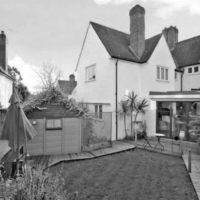Over the past year, Fuller Long have been working with a client regarding a planning application within the Dover District Council area, for which we were recently granted planning permission at appeal.
The applicant came to us for advice after having been given strong indications that both his original and revised planning applications for a single detached residential unit were likely to be refused by the Council. The owner of the property wanted to install a small outbuilding in his garden in order to more comfortably accommodate his growing family and their changing requirements. This outbuilding was proposed to provide a very modest living space, comprising a small bedroom, a bathroom connecting to an existing cesspit to the north, a study, a lounge/seating area and would contain no kitchen facilities.
The original planning application was refused on the grounds that it would constitute an unjustified, unsustainable form of development which would be tantamount to the creation of a new dwelling in the countryside. The Council concluded this would be contrary to the sustainability aims and objectives of the National Planning Policy Framework.
Although the site does not fall with the Green Belt or an Area of Outstanding Natural Beauty, the Council does have a specific policy in place that controls residential development outside of settlement boundaries.
Our consultant was able to demonstrate that the proposed outbuilding did not include cooking, dining or bath facilities and is to share these with the existing dwelling, meaning that it will continue to rely on the main house for day-to-day living. The outbuilding is required to provide additional ancillary living space only, thus making it permissible under the Council’s Core Strategy Policies.
Fuller Long’s successful supporting appeal statement centered around the argument that the appellant was in need of more living space and the outbuilding was proposed to provide flexibility for a variety of uses that are all ancillary to his family’s enjoyment of their property.
Additionally, our consultant suggested that the ancillary nature of the development should be controlled by condition to ensure that the structure is not occupied other than for purposes ancillary to the residential use of the main dwelling at the property.
The Planning Inspector agreed and allowed the appeal on condition the building not be occupied other than for purposes ancillary to the residential use or sold off independently from the existing dwelling at any time.
If you have been refused planning permission and would like to seek assistance in submitting an appeal, Fuller Long can be of assistance. Our consultants are experts in submitting planning appeals and have had considerable success over the years. Call 0808 164 1288 or email hello@fullerlong.com to speak with one of our Consultants today.





